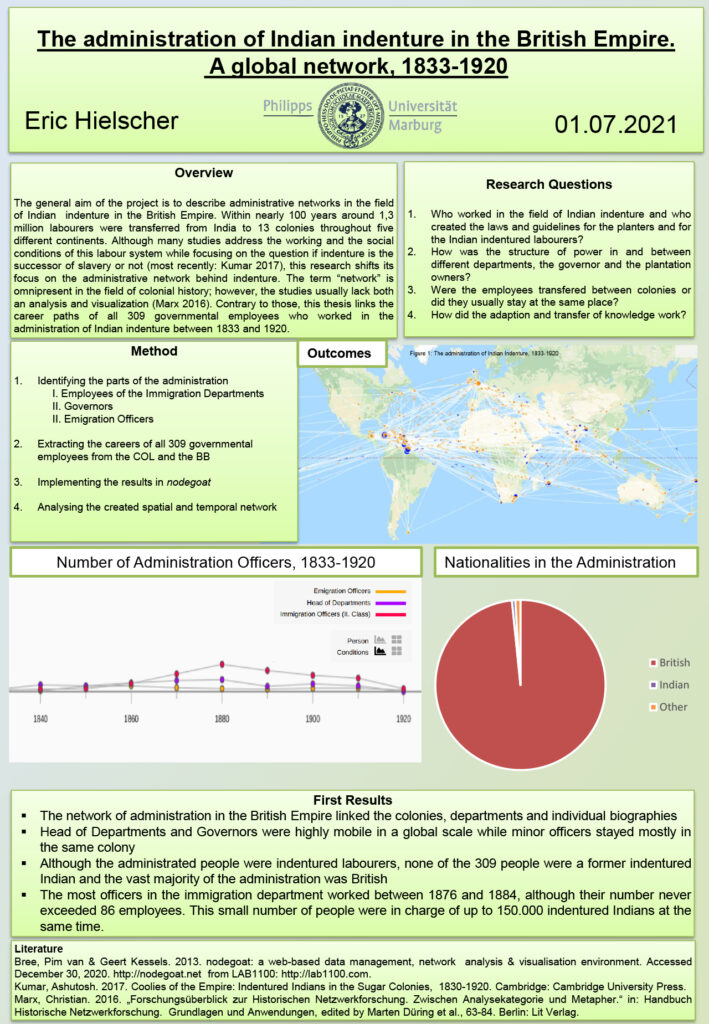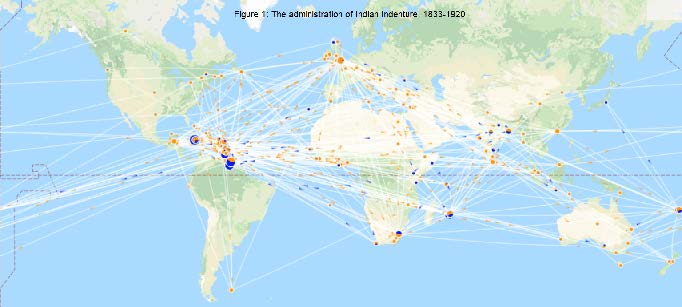Eric Hielscher
Time and Place: Thursday, 01.07., 16:00–17:00 – Room 1
Session: Poster session – Institutions and Institutionalisation
The general aim of the thesis is to describe administrative networks in the field of Indian indenture in the British Empire. Within nearly 100 years around 1,3 million labourers were transferred from India to 13 colonies throughout five different continents. This migration had a worldwide economic, political and social effect. Although many studies address the working and the social conditions of this labour system while focusing on the question if indenture is the successor of slavery or not (most recently: Kumar 2017), this research in general approaches the labour system as a network. The term “network” is omnipresent in the field of colonial history; however, the studies usually lack both an analysis and visualization (Marx 2016, 53). Contrary to those, this thesis links the career paths of all 308 governmental employees who worked in the field of Indian indenture between 1833 and 1920. The special focus lies on the governors of the colonies as they created and passed new laws, set the directives and manned every position in the Immigration departments according to their ideas and wishes.
The theoretical focus is to provide an insight into the impact and the adaption of patronage and knowledge within the British Empire to connect the duality between “center” (London) and “periphery” (colonies) of the Empire. Modern research tends to shift the power relations from London towards the colonies of the British Empire. The latter were led by their governors who made the main choices as “men-on-the-spot” for their territory. This thesis shows the administration of the Indian indenture as an example to underline that London was still the hub of the network where recruitment, promotions and career paths were combined in the Colonial Office as the central institution.
Extracted data from the Colonial Office Lists (1862-1920) and the Blue Books of each of the 13 colonies (1833-1861) form the core sources of this study. These will be complemented with “close-reading” such as research in (auto)-biographies and further archival documents regarding Indian indenture in general with the core focus lying on the administration. Sources exist from the high positions of governors to the sub-levels of immigration agents. In my project, Excel is used to structure the data and nodegoat to visualize and analyze the career paths in time and space (van Bree & Kessels 2013). For example, the graphic below visualizes the career paths of all 94 governors (orange) and of all 214 subordinated officers (blue) who were involved in the Indian indenture system. The wider implications are to establish a database from governmental workers in the British Empire and to get a general understanding of on one hand the system of recruitment and promotion and on the other hand the acquisition and transfer of knowledge within the 19th century.
The first result of my work is that governors were the powerbrokers of the network and the most valuable carriers of knowledge in the British Empire. Despite some missing data about the lowest ranks, there is enough evidence that governors were the central piece in transferring knowledge throughout the Empire, which is shown in Figure 1. There were almost twice as many subordinated officers as the governors, but only the latter traveled extensively throughout the British Empire and set laws and guidelines for the system of Indian indenture. Further findings conclude that nearly every governor (96,8%) was born or at least educated in England and governed a colony on average 4,5 years with his specific education and the experience he had gained before being transferred to a new colony. Because of their similar educational background, the governors developed a certain mindset that they carried from Great Britain and Ireland to the rest of the world. With this specific educational history and their practical skills, the governors made specific decisions and changed laws accordingly. The main argument of the thesis is that London did not have direct involvement in the decision-making processes in the colonies, but a rather indirect impact with the evolvement of certain mindsets and the awarding of promotions.
The next research question I aim to answer in 2021 is whether a system existed behind the career paths of governmental workers.
Archival Sources:
The Colonial Office Lists, 1862-1920, The National Archives, London, England. The Blue Books of the Colonies, 1838-1861, The National Archives, London, England.
Literature:
Bree, Pim van & Geert Kessels. 2013. nodegoat: a web-based data management, network analysis & visualisation environment. Accessed December 30, 2020. http://nodegoat.net from LAB1100: http://lab1100.com.
Kumar, Ashutosh. 2017. Coolies of the Empire: Indentured Indians in the Sugar Colonies, 1830-1920. Cambridge: Cambridge University Press.
Marx, Christian. 2016. „Forschungsüberblick zur Historischen Netzwerkforschung. Zwischen Analysekategorie und Metapher.“ In Handbuch Historische Netzwerkforschung. Grundlagen und Anwendungen, edited by Marten Düring et al., 63-84. Berlin: Lit Verlag

